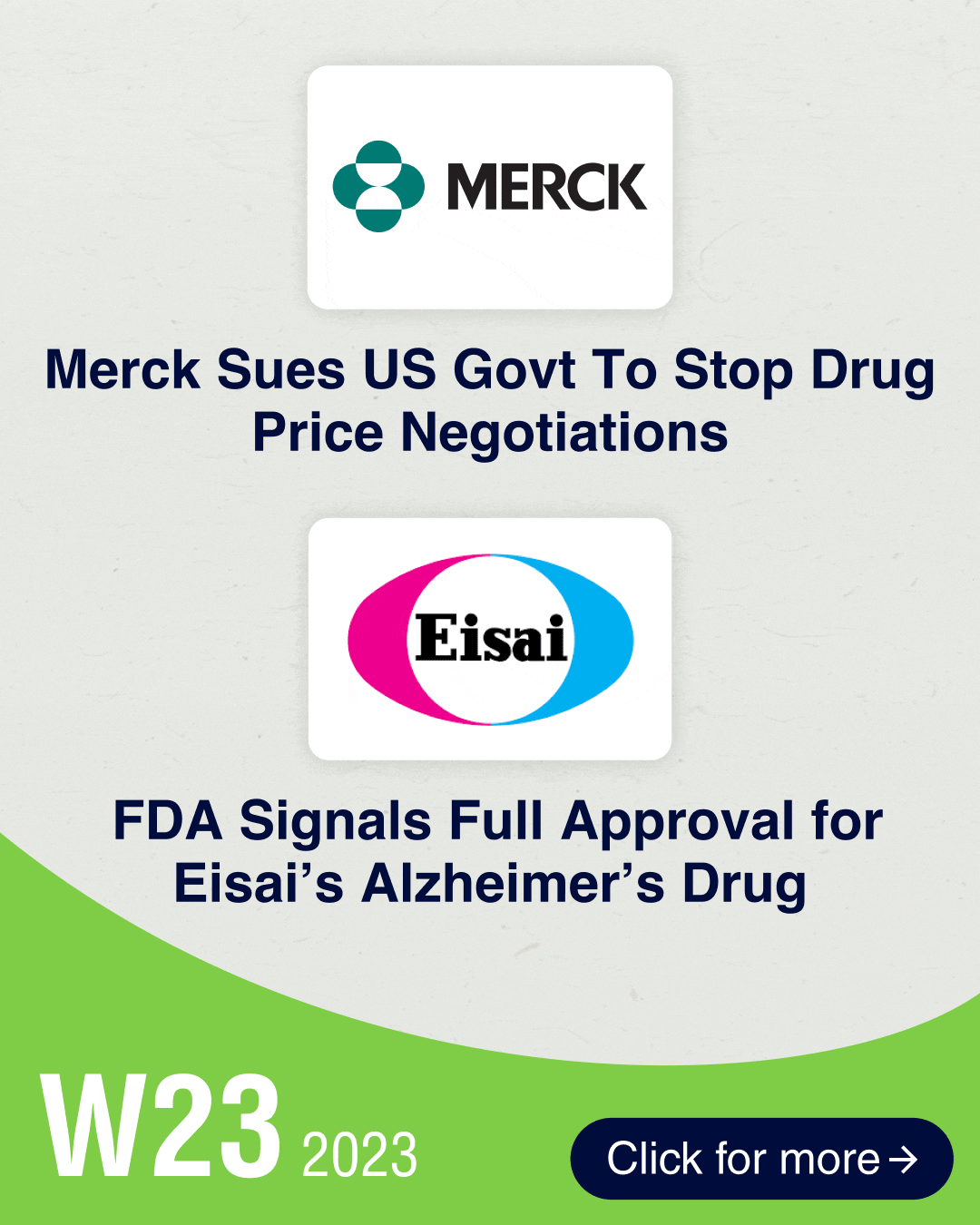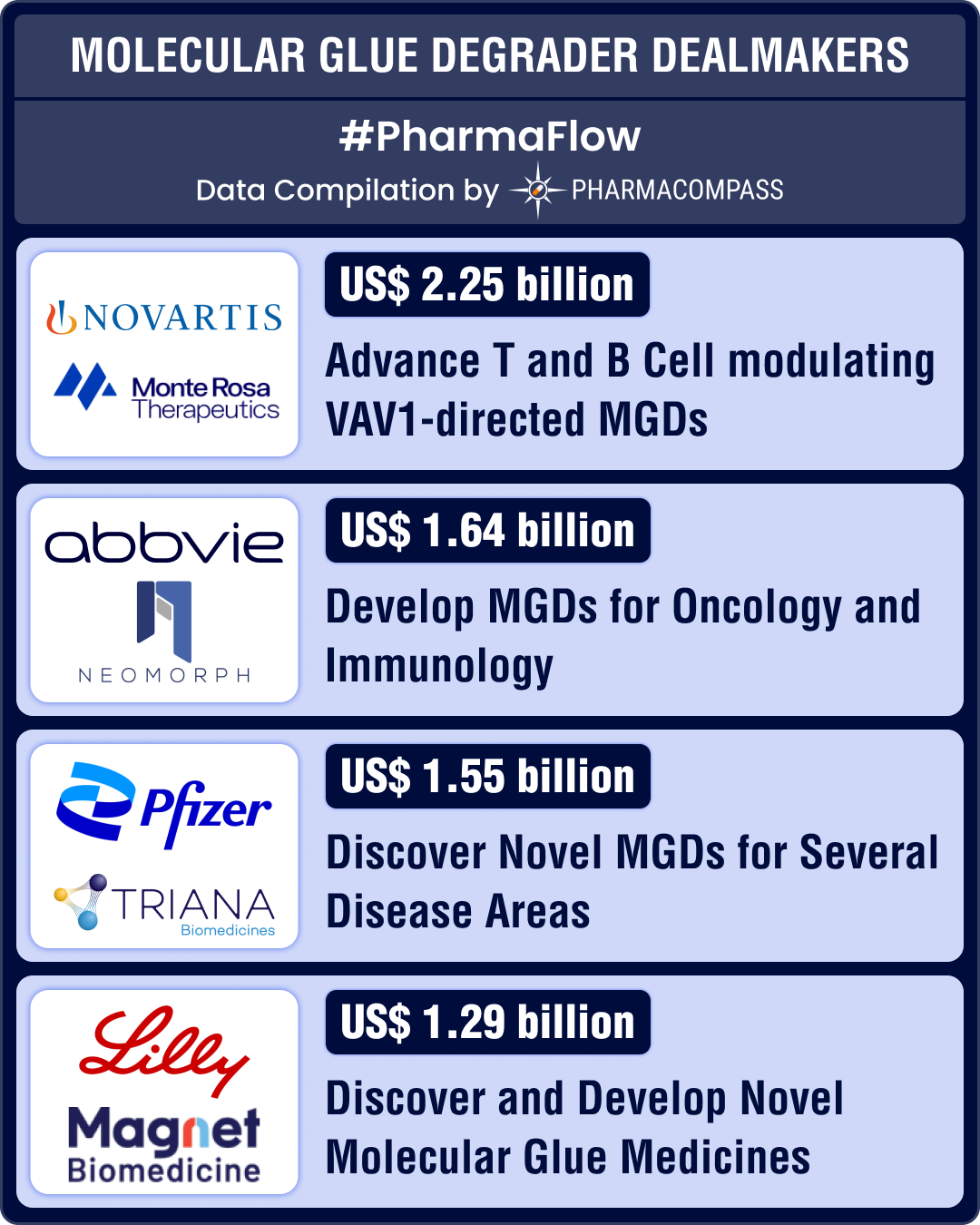
By PharmaCompass
2023-06-08
Impressions: 1,328 (Article) || 1 (Video)
Merck has filed a lawsuit against the US government in order to block Medicare from negotiating lower prescription drug prices under the Inflation Reduction Act (IRA). This marks the first legal challenge by a drugmaker against the Act.
The US Food and Drug Administration (FDA) has authorized temporary import of an unapproved chemotherapy drug from China to alleviate an acute shortage of cancer drugs in the US. The agency has also put all safety concerns over Leqembi to rest by signally full approval of the Alzheimer’s drug from Eisai and Biogen.
In regulatory news, FDA has issued an import alert to Intas Pharma’s manufacturing facility near Ahmedabad, India. However, the agency has allowed the drugmaker to continue supplying 24 products that are in short supply in the US. FDA has also issued an Official Action Indicated (OAI) to Indoco Remedies’ sterile facility in Goa (India).
After FDA approval, the European Commission has also authorized GSK’s respiratory syncytial virus (RSV) vaccine Arexvy for the prevention of lower respiratory tract disease in adults aged 60 and above. Meanwhile, FDA’s staff reviewers have determined that Sanofi and AstraZeneca’s experimental RSV therapy – nirsevimab – is safe and effective in preventing RSV infections in infants. And, the agency has approved AstraZeneca and Merck’s drug Lynparza for the treatment of patients with metastatic castration-resistant prostate cancer (mCRPC) whose tumors have BRCA mutations.
Merck sues US government to stop drug price negotiations by Medicare under IRA
Merck has filed a lawsuit against the US government seeking to block Medicare from negotiating lower prescription drug prices under the Inflation Reduction Act (IRA). This marks the first legal challenge by a drugmaker against the Act, which the pharmaceutical industry argues will reduce profits and discourage future investments in the development of innovative therapies.
According to an article published in FiercePharma, Biogen and Novartis may also follow suit.
“In Merck’s lawsuit, they talk about extortion and that’s accurate,” Biogen CEO Chris Viehbacher said, registering severe criticism of the IRA. Novartis CEO Vas Narasimhan, said: “The law is draconian in how it is set up.”
The lawsuit claims that the program would force drugmakers to negotiate drug prices below market rates, violating the Fifth Amendment of the US Constitution. The IRA was signed into law last August, giving Medicare the power to negotiate prices for a limited number of drugs.
FDA puts concerns to rest, signals full approval for Eisai-Biogen’s Alzheimer’s drug
In January, FDA had granted accelerated approval to Leqembi, even as there were concerns over the safety of Eisai and Biogen’s Alzheimer’s drug. On Wednesday, FDA said data from a late-stage trial of Leqembi has suggested it offers meaningful benefit to patients. The agency said safety concerns should not hamper its chances of a traditional approval. Eisai’s application for a full approval is based on data showing Leqembi slowed the rate of cognitive decline in patients with early Alzheimer’s by 27 percent compared to a placebo. A panel of external advisers to the FDA will meet on Friday to discuss the application.
The use of certain blood thinners with Leqembi has been linked to a risk of brain hemorrhage. But the FDA staff said these risks can be described in the prescribing information for the drug.
FDA allows import of unapproved chemo drug from China to alleviate shortage
FDA has authorized temporary importation of an unapproved chemotherapy drug from China to alleviate an acute shortage of cancer drugs in the US. Qilu Pharmaceutical, a Chinese manufacturer of cisplatin injections, has received the agency’s permission to export the drug to the US market. Qilu’s cisplatin injection does not have an FDA approval. It is collaborating with Toronto-based Apotex to distribute 50-mg cisplatin vials in the US.
Cisplatin is widely used in chemotherapy medication used to treat various cancers. Currently, there are shortages of 17 cancer drugs in the US. Meanwhile, the director of the FDA’s Oncology Centre, Richard Pazdur, has put the blame for the shortage on the industry’s failure to invest in expanding production capacity.
FDA allows import of 24 drugs in shortage from Intas, even as it’s put on import alert
Last December, FDA had issued a Form 483 with 11 observations to Intas Pharma’s manufacturing facility near Ahmedabad, India, after it was discovered that its employees had destroyed documents related to the plant’s manufacturing practices.
Now, the agency has issued an import alert to the same facility, which will prevent the supply of drugs manufactured at this plant to the US. However, the alert allows the drugmaker to continue supplying 24 products that are in short supply in the US. The excluded drugs include injectables for cancer and infections, as well as tablets for sedation, kidney stones, hormones and heart issues. Intas said it is actively working to address FDA’s concerns.
Issues OAI to Indoco’s Goa site: In February, FDA had issued a Form 483 with four observations to Indoco Remedies’ sterile facility in Goa (India) following an inspection conducted from February 20 to 28. The agency has now escalated its action against the site by issuing an Official Action Indicated (OAI).
EU okays GSK’s RSV jab; Sanofi-Astra’s RSV drug safe in infants, says FDA
The European Commission has authorized GSK’s RSV vaccine Arexvy for the prevention of lower respiratory tract disease in adults aged 60 and above. This makes Arexvy the first RSV vaccine authorized in Europe. GSK is planning to launch the vaccine before the start of the next RSV season. The EU authorization follows FDA’s approval of Arexvy about a month ago.
Meanwhile, FDA’s staff reviewers have determined that Sanofi and AstraZeneca’s experimental RSV therapy – nirsevimab – is safe and effective in preventing RSV infections in infants. Clinical trials showed a positive safety profile for the therapy, the reviewers said. This news precedes an upcoming advisory committee meeting to discuss the drug’s marketing application. In May, the FDA had approved RSV vaccines from GSK and Pfizer.
New approval for Lynparza: FDA has approved AstraZeneca and Merck’s drug Lynparza for the treatment of newly diagnosed advanced prostate cancer. The approval allows Lynparza to be used in combination with Johnson & Johnson’s Zytiga and a steroid specifically for patients with metastatic castration-resistant prostate cancer (mCRPC) whose tumors have BRCA mutations.
Meanwhile, AstraZeneca has announced that a post-marketing study on its bleeding reversal drug Andexxa has been stopped early after it met its efficacy endpoint at the planned interim analysis. In the study, patients on blood thinners who received Andexxa showed improved bleeding control compared to the control group. Andexxa has gained accelerated approval in the US and conditional approval in the EU, Switzerland, and the UK.The PharmaCompass Newsletter – Sign Up, Stay Ahead
Feedback, help us to improve. Click here
Image Credit : Phisper Infographic by PharmaCompass license under CC BY 2.0
“ The article is based on the information available in public and which the author believes to be true. The author is not disseminating any information, which the author believes or knows, is confidential or in conflict with the privacy of any person. The views expressed or information supplied through this article is mere opinion and observation of the author. The author does not intend to defame, insult or, cause loss or damage to anyone, in any manner, through this article.”








